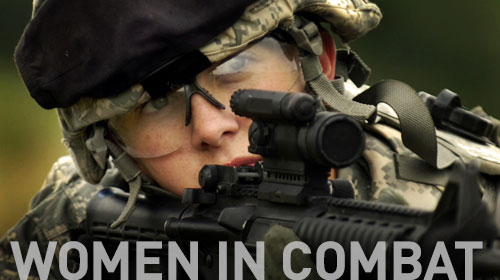
On January 24, 2013, we saw a great victory for U.S. servicewomen when the Department of Defense it was ending the ban on women serving in combat units and occupational specialties. As the Pentagon and the armed services begin implementing the change in policy, there are many issues that must be resolved, and we'll be keeping a close eye on the process.
On January 24, 2013, we saw a great victory for U.S. servicewomen when the Department of Defense announced it was ending the ban on women serving in combat units and occupational specialties. As the Pentagon and the armed services begin implementing the change in policy, there are many issues that must be resolved, and we'll be keeping a close eye on the process. In an ongoing blog series, we will bring you voices of military experts, veterans, and other stakeholders who will discuss these issues and the need to fully integrate women in the armed forces.
When I was commissioned in 2008, I never once considered the possibility that I would be facing discrimination in my career as a female officer of the United States Marine Corps. When you are in basic training, your life is black and white. Nothing is questioned, from the way you lace your boots to the requisite sock bun hairstyle. I simply accepted that certain military occupational specialties (MOS, what we call career fields) were not available to me because I am a woman, because that's the way things were.
Then in 2010, I volunteered for the once-in-a-lifetime opportunity to be a member of the Marine Corps' new Female Engagement Team, in which women Marines live with and go on missions with Marine Infantrymen in active combat zones. As a team leader, my team of female Marines was selected from specialties all across the Corps. I had the pleasure of working with communications Marines, armorers, admin personnel, and Marines from every other combat support MOS--the only specialties that were available to women at the time.
During the three months before we deployed, my team was sent to participate in an exercise that every infantry unit has to complete before deploying. We were told that we were only allowed to participate in one week of the month-long exercise. After the exercise started, we soon realized that our team was not incorporated into the training in any way, despite our best efforts to integrate our platoon with the infantry units.
This meant that, prior to arriving in Afghanistan, my team never met—let alone trained with—the infantry units they would be attached to for our seven-month deployment. The first time my Marines were ever exposed to the operational procedures they would be expected to conduct from muscle memory while under fire was the day after they arrived at their patrol bases in Afghanistan.
Because of the combat exclusion policy, women Marines were not allowed to physically "co-locate" with a direct ground combat unit. In order to comply with this policy, my team was forced to return to the main Marine base in Afghanistan every 45 days for a single night and catch the next convoy or flight to return to our patrol bases. We did not return to that main base for any operational purpose; it was simply a charade so that we met the letter of the law. This excessive and unnecessary travel between the bases put all of my Marines in danger for a legal façade, and in some cases, commanders were forced to reschedule major operations due to the lack of an available Female Engagement Team.
Upon returning home, my team was disbanded within three days, and we returned to our prior support units who had not deployed with us. Having broken up so quickly, it was difficult to ensure that my Marines received that appropriate support for their combat experiences, from mental health to recognition for their actions. Ensuring that one's Marines receive proper post-deployment care is one of the duties of being an officer, one that I take very seriously. I believe my Marines were short-changed in this regard as a result of the ad-hoc nature of the team.
These arbitrary rules that we have been subjected to simply because of our gender have hurt the military readiness of the greatest fighting force in the world. That's why I joined three other servicewomen in a lawsuit challenging the combat exclusion policy last year.
Fortunately, the combat exclusion policy was rescinded earlier this year. As plans for integrating women into combat roles are revealed and put into place, we need more information from the Department of Defense about when women will be able to compete for the military occupational specialties that have been closed to them and whether we'll continue to be subjected to arbitrary rules like the 45-day reset. While lifting the ban is a monumental step in the right direction, we still have a way to go.
Colleen Farrell is now a Captain in the U.S. Marine Corps Reserves. As a First Lieutenant, she deployed to Afghanistan, where she served as a section leader of Female Engagement Teams (FETs). During her tour, Lt. Farrell managed between 12 and 20 FET members who would go out on patrols with the infantry, doing outreach and intelligence and assessing security issues. In November 2012 she became a plaintiff in an ACLU lawsuit challenging the combat exclusion policy, and in January 2013, Secretary Panetta rescinded the policy and required the military to begin implementing this change. The litigation is ongoing.
Learn more about combat exclusion and other civil liberty issues: Sign up for breaking news alerts, , and .

